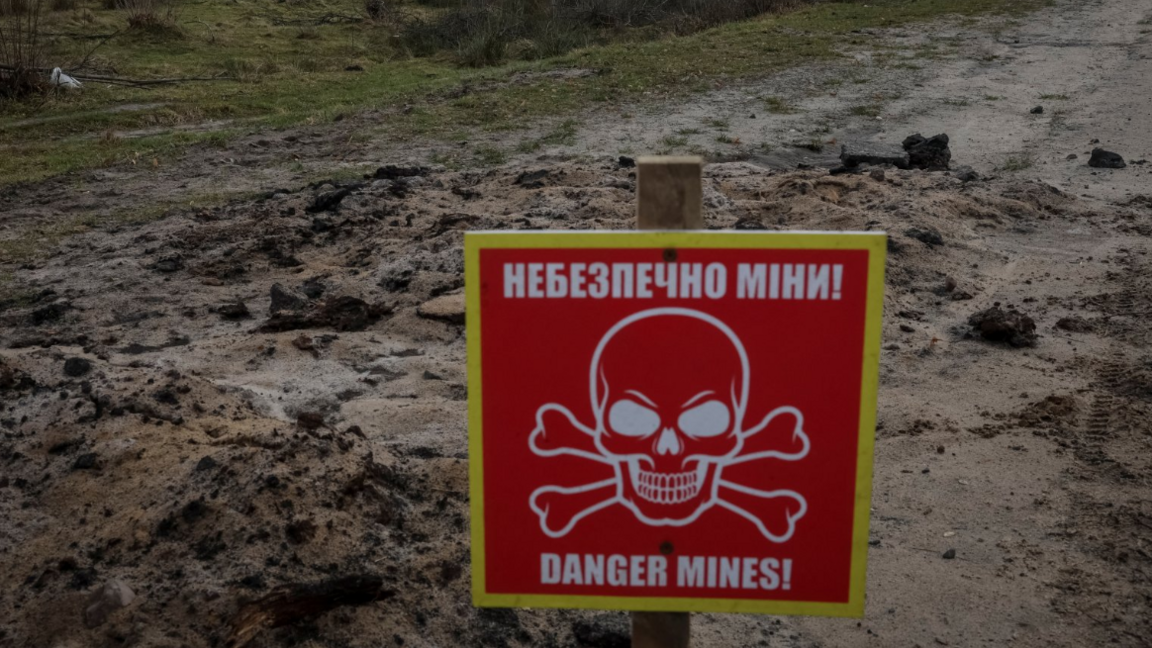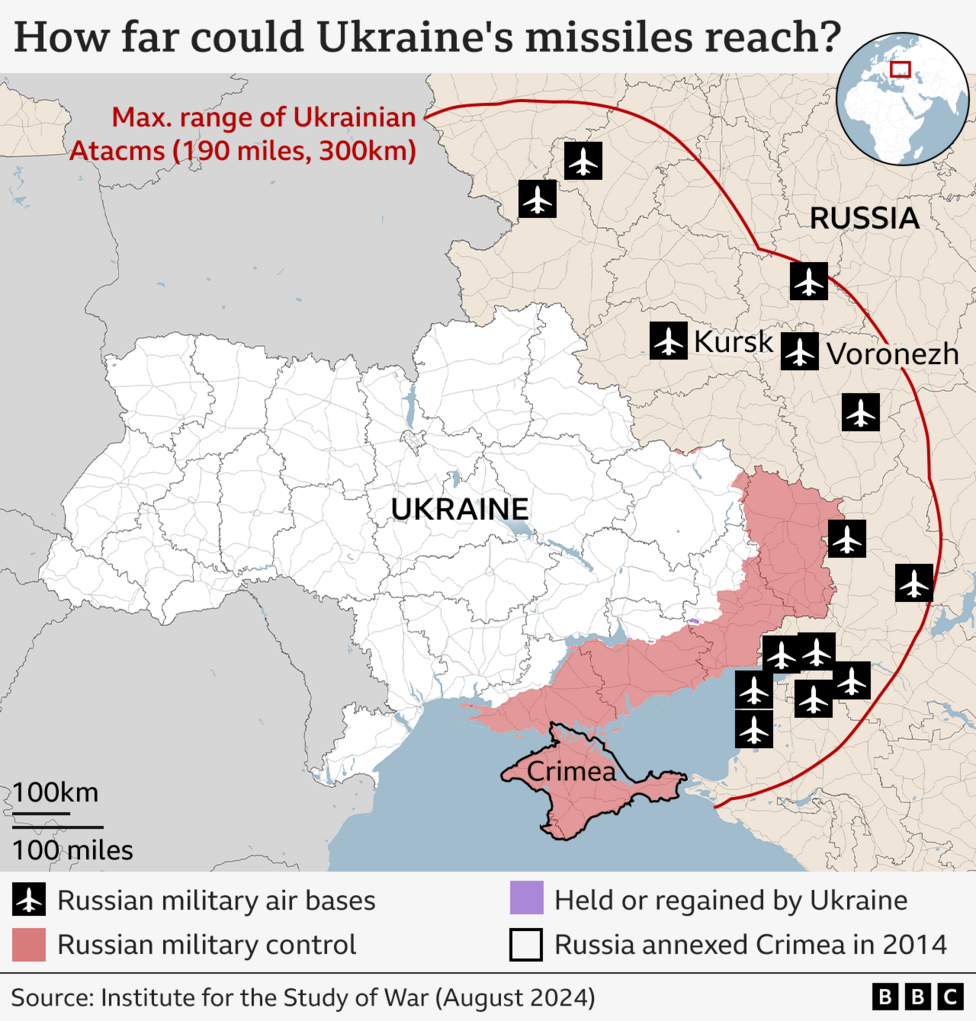Biden agrees to give Ukraine anti-personnel mines

- Published
US President Joe Biden has agreed to give Ukraine anti-personnel land mines, a US defence official told the BBC, a move seen as an attempt to slow Russian troops who have been steadily advancing in Ukraine's east in recent months.
The official, who was speaking on condition of anonymity, said such mines would be delivered soon and Washington expected that they would be used on Ukraine's territory.
Ukraine was also committed to not using the mines in densely-populated areas, the official said.
Separately, the US State Department said it would close its embassy in Kyiv after it "received specific information of a potential significant air attack on 20 November".
"Out of an abundance of caution, the embassy will be closed, and embassy employees are being instructed to shelter in place," it said in a statement, external.
"The US embassy recommends US citizens be prepared to immediately shelter in the event an air alert is announced."
The embassy has previously issued similar warnings of potential air attacks at New Year and around Ukraine's Independence Day in August.
The Italian and Greek embassies said they were also closing temporarily following the US warning.
Ukraine's defence intelligence alleged that warnings of large scale missile strikes on Ukrainian cities were being spread by Russia as part of a "massive information and psychological attack against Ukraine".
The government agency urged Ukrainians to only trust information from official sources and not to ignore air raid signals.
Overnight, both Ukraine and Russia reported major drone attacks on their respective territories.
It was not immediately known whether there were any casualties.
Russian gains accelerate as Ukraine's Kursk gamble falters
- Published20 November 2024
Ukraine fires US-supplied longer-range missiles into Russia, Moscow says
- Published19 November 2024
Putin approves changes to Russia's nuclear doctrine
- Published19 November 2024
The provision of anti-personnel land mines is the latest move by the outgoing US administration to bolster Ukraine's war effort before Donald Trump returns to the White House on 20 January.
For Ukraine's forces trying to halt Russian advances up and down the long front line in the east, mines are vital.
Russia's tactics currently involve sending small groups of soldiers - sometimes no more than three to five men - to walk or ride motorbikes behind Ukrainian positions. These men are often killed or captured.
However, in besieged towns like Chasiv Yar and Kurakhove, Ukrainian analysts say squads will sometimes be sent out every 20 minutes for hours at a time, creating problems for Ukrainian troops.
"It's very difficult to deal with," Serhiy Kuzan from the Ukrainian Security and Cooperation Centre told the BBC.
"We need more anti-personnel mines."
Much of the fighting is taking place in rural parts of the Donbas, wooded areas between huge open areas of farmland.
With much of the civilian population already evacuated, Ukraine argues that the tactical use of "non-persistent" mines poses minimal risk to civilians and is absolutely essential to stem Russia's advance.

Russia has deployed landmines liberally since the start of its full-scale invasion of Ukraine in February 2022 but international objections to the use of such weapons on the grounds that they pose a risk to civilians had prevented the Biden administration from signing off on them.
The US defence official confirmed to the BBC that Ukraine had pledged to use only mines that remained active for a limited period of time.
The US "non-persistent" mines differ from Russia's as they become inert after a pre-set period of time - anywhere from four hours to two weeks. They are electrically fused and require battery power to detonate. Once the battery runs out, they will not detonate.
Washington has already been providing anti-tank mines to Ukraine, but the anti-personnel land mines - which can be rapidly deployed - are designed to blunt the advances of ground forces.
Russia and the US are not signatories to the Ottawa Convention banning the use or transfer of anti-personnel landmines, although Ukraine is. However, since Russia's full-scale invasion, more than 20% of Ukrainian territory is estimated to have become contaminated by mines.
Earlier, it was confirmed that US-made longer-range Army Tactical Missile System (Atacms) missiles had struck targets inside Russia only days after reports emerged that the White House had granted permission for their use.
Russia's defence ministry said the strike had targeted the Bryansk region bordering Ukraine to the north on Tuesday morning.
It said five missiles had been shot down and one had caused damage - with its fragments starting a fire at a military facility.
But two US officials said initial indications suggested Russia had intercepted just two missiles out of around eight fired by Ukraine.
The BBC has not been able to verify independently the contradicting figures.
Russian Foreign Minister Sergei Lavrov accused Washington of trying to escalate the conflict.
The Kremlin has vowed to retaliate.
On Tuesday, Russian President Vladimir Putin approved changes to Russia’s nuclear doctrine, setting out new conditions under which the country would consider using its arsenal.
It now says an attack from a non-nuclear state, if backed by a nuclear power, will be treated as a joint assault on Russia.
Commenting on the changes, US state department spokesperson Matthew Miller said: "Since the beginning of its war of aggression against Ukraine, [Russia] has sought to coerce and intimidate both Ukraine and other countries around the world through irresponsible nuclear rhetoric and behaviour."
Additional reporting by Paul Adams, the BBC's diplomatic correspondent, reporting from Dnipro, Ukraine